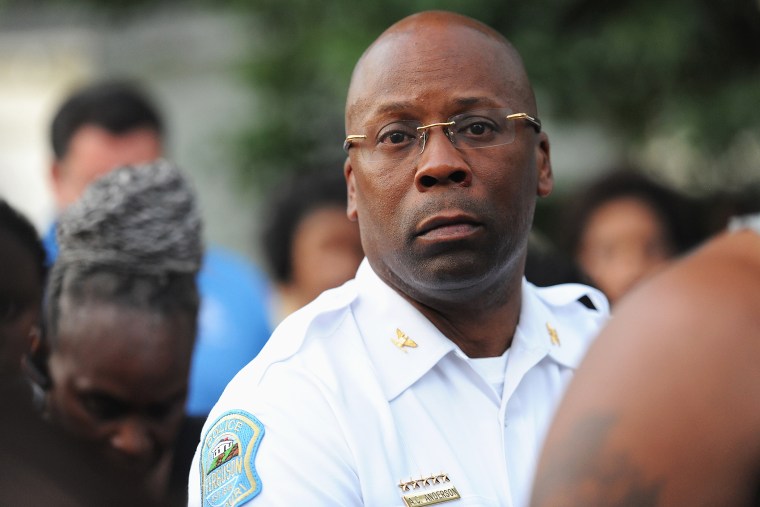The interim police chief brought in to restore frayed community relations in Ferguson, Missouri, is now handing over his badge and his gun.
Andre Anderson is stepping down Wednesday from his temporary post running the Ferguson Police Department, packing up after just four months to return to Arizona, where his old gig as police commander of Glendale will be waiting for him.
Anderson, who is black, was tasked with mending trust between a largely white police force and the community in the predominantly African-American suburb of St. Louis. Though he was not the first to fill the interim role -- he succeeded Assistant Police Chief Eickhoff, who stepped up for the position in March -- Anderson leaves behind a vacancy that more and more embattled police departments are also struggling to fill.
Top cops from at least six different police departments across the country have either been outright fired or removed from their posts within the last year, all in the wake of incidents involving officers using violent and/or excessive force. The power shakeups bring on a new era of accountability that extend beyond the actions of individuals accused of police brutality.
RELATED: Chicago mayor fires police chief in wake of video release
With that, however, adds a layer of uncertainty: Will fresh leadership be able to uproot entrenched, racially biased practices blamed for so many unnecessary tragedies?
Tuesday’s resignation of Chicago Police Supt. Garry McCarthy, the latest department head to step down amid controversy, was designed to “strengthen the fabric of trust” between police and the community, according to Chicago Mayor Rahm Emanuel. Recently released dashcam video showing the brutal death of 17-year-old Laquan McDonald, who was shot 16 times, had virtually eviscerated whatever faith the community had in its law enforcement.
Public and political pressure brought the leadership of both McCarthy and Emanuel into question after it took more than 13 months to charge the officer who fired the shots. The dragged out investigation, which prompted allegations of a cover up, was compounded by yet another officer-involved shooting -- the death of 22-year-old Rekia Boyd. McCarthy eventually agreed that the officer involved in that shooting should be terminated, but the decision came a full three years after Boyd's death.
The Chicago police chief's ouster comes as the conventional wisdom in policing continues to be fiercely challenged -- the idea that the integrity of investigations, and the veil of secrecy its often afforded, does not unilaterally trump transparency and the public's right to information.
Before McCarthy, Fort Myers Police Chief Doug Baker was fired in August after he was accused of lying during an internal affairs investigation. The department was already under fire after it came to light that an Oakland Raiders star was unlawfully detained.
Baltimore Mayor Stephanie Rawlings-Blake fired Police Commissioner Anthony Batts in July, just over two months after riots broke out in the wake of the death of Freddie Gray, whose spine was severed while in police custody. Gray died days after his arrest.
In a small community outside of Detroit, Inkster Police Chief Vicki Yost stepped down in April, days after an officer was charged with assault for bloodying a man during a traffic stop.
Michael Mann, chief of police in Coconut Creek, Florida, was forced to resign after officers tried to subdue a man with stun guns, and he later died from his injuries. The officers involved were not certified to use Tasers, according to the Sun Sentinel.
RELATED: Tensions persist between police and African American communities
It all started in Ferguson, where former police chief Tom Jackson for months resisted calls to resign. He oversaw the initial investigation into the death of Michael Brown, an unarmed teen shot dead by a veteran police officer, as well as the fumbled roll out of information that leaned toward victim-blaming. He remained in charge for another seven months -- during the riots, protests and militarized police presence on the streets -- only to step down after a Department of Justice report railed against his leadership and the policies of the department he ran.
Arguably little has changed since Jackson stepped down. The expectations that Anderson faced in his interim role were stacked against him from the beginning. He was to restore relations with a community that spawned an entire social movement in demanding dramatic police reform. The Department of Justice had already exposed every unconstitutional and racially-biased policing tactic that Ferguson officers had used against residents for years -- now it was time to effectively rebuild the rule book from scratch.
Ferguson officials wanted to bring in an outsider, a fresh face who reflected the community's diversity, to come shape up the city. But Anderson's departure Wednesday shows that it's going to take more than going after those in power to go after the institutional problems.
